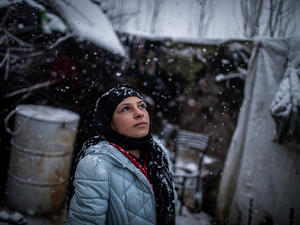Nicaraguans strive to support themselves in exile in Costa Rica
Nicaraguans strive to support themselves in exile in Costa Rica

UN High Commissioner for Refugees Filippo Grandi chats with Nicaraguan asylum-seeker Carmen* at her stand at a market in Upala, Costa Rica.
As political protests spread in Nicaragua three years ago, grocery shop owner Carmen* gave food to students calling for reforms. When a crackdown followed, she packed a bag, gathered up her young daughter and fled over the border to Costa Rica.
“We were being threatened…. (and) I had to leave everything behind, absolutely everything I had. I even left behind my dreams,” said 30-year-old Carmen, whose store was ransacked in the ensuing turmoil. “I had to abandon the seven years of work I had invested in my business in order to save my daughter.”
There are currently some 87,000 Nicaraguans like Carmen seeking asylum in Costa Rica. Three years later, they are still trying to find a way forward.
When she reached safety, Carmen and her daughter first found shelter in a tiny room that a kind-hearted Costa Rican family lent them. They had no running water or electricity, and when the wind blew, it would lift up the tin roof, which also offered little protection against the tropical rains.
“Everything stopped. We couldn’t do anything.”
A life-long entrepreneur, she was hopeful that she could do a brisk business in making and selling traditional Nicaraguan sweets called “cajeta,” a sort of pudding. But without an oven or even a fridge, that seemed impossible – until Carmen got help from Fundación Mujer, a non-profit that works with UNHCR, the UN Refugee Agency.
They provided her with small business training, as well as seed money that allowed her to buy the appliances she needed to prepare her wares – a tempting selection of treats made following her grandma’s recipes from organic, locally sourced ingredients. Sales were just beginning to take off when the coronavirus pandemic hit.
- See also: UN High Commissioner for Refugees commends Costa Rica for commitment to those forced to flee
“When that happened, everything stopped,” Carmen recalled. “We couldn’t do anything.”
Life was again very hard for Carmen, her now six-year-old daughter, and her husband, who had joined them a year later. That was when the family received another lifeline – a stand in the newly founded “Mercado Upaleño,” a weekly outdoor market in the border town of Upala in northern Costa Rica.
“It helps promote peaceful coexistence between local communities.”
A municipal project made possible with support from UNHCR, the market aims to support local farmers, artisans and shopkeepers, while at the same time offering buyers and sellers protection against COVID-19, thanks to fresh air, masks and social distancing.
During a visit to the market on 10 February, UN High Commissioner for Refugees Filippo Grandi praised the initiative as an example of a win-win project that benefits both asylum-seekers and the communities that host them and which could be applied elsewhere.
“It helps revitalize the economy that is only now starting to come out of the COVID impact, and it also helps promote peaceful coexistence between local communities in a very deprived area, and communities of refugees and asylum seekers,” he said, after sampling Carmen’s sweets and some of the other products on offer. “I think it’s a good model for many other places where asylum seekers and refugees live in the community.”
The High Commissioner’s six-day mission to Latin America comes as countries are battling the impact of COVID-19, which has cost hundreds of thousands of lives and taken a devastating economic toll throughout the region. The trip also included a visit to Colombia, during which the government announced it would regularise Venezuelans to help them integrate into the Andean nation.
For Carmen and other small businesspeople like her, the weekly market in Upala has been a lifesaver. With her earnings from her stall, as well as takeaway orders that are booming thanks to the exposure the market has given her, she is now able to support her family.
The goal she long held of one day expanding her grocery in Nicaragua has blossomed into a new dream: Carmen now hopes to one day secure her sweets a spot on supermarket shelves throughout Costa Rica.
“My business is a bunch of good things rolled into one,” she said with a smile. “In addition to sustaining me economically, it brings me the joy of being able to have shared experiences with other people.”
*Name has been changed for protection reasons.







